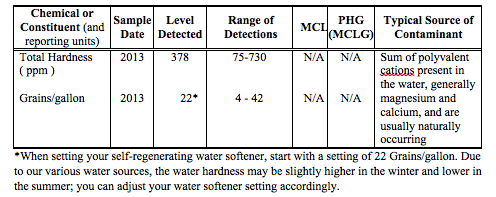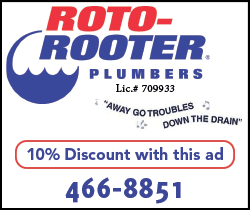Hard Water & Water Softeners
The term ‘hard water’ refers to water that has a high mineral content. Groundwater in our area is hard because the water picks up dissolved calcium and magnesium minerals as it travels through the ground. The high mineral content in the water makes it hard for detergents to work and leaves behind scale and deposits on your glasses, dishes, car, and even your hair and clothes, leaving spots on dishes and stiffening your hair and clothes.
Many households use water softeners to reduce the amount of minerals in the water. The most common type of water softeners, the type you add bags of salt to, are called self-regenerating water softeners. These water softeners work by running the hard water through a tank filter containing resin beads that attract the hard mineral ions. The resin tank is regenerated, or cleaned, by flushing a large quantity of brine solution through the resin tank. This flushing removes the magnesium and calcium ions and replaces them with sodium ions. As the hard water is sent through the tank, the magnesium and calcium ions displace the sodium ions, sending the excess brine to the wastewater system.
Most of the salt used in this kind of water softening system goes to the wastewater system. Unfortunately, standard wastewater treatment technology does not remove salts in the treatment process, so it is important to use water softening systems that add the least amount of salts needed to treat the water. Opting for a portable exchange water softening system that is recharged offsite is the best choice because it keeps the excess salts out of our wastewater and out of our groundwater which ultimately protects our basin and drinking water supplies.
If you are a residential customer using a self-regenerating water softener, refer to the following table from the Templeton Community Services District 2013-2014 Consumer Confidence Report:

At this time, all commercial and industrial customers are prohibited from using a self-regenerating type water softener. If you are a residential customer, and have an older style water softener, please consider replacing it with a portable exchange system. Let’s all do our share and protect our water supply!









